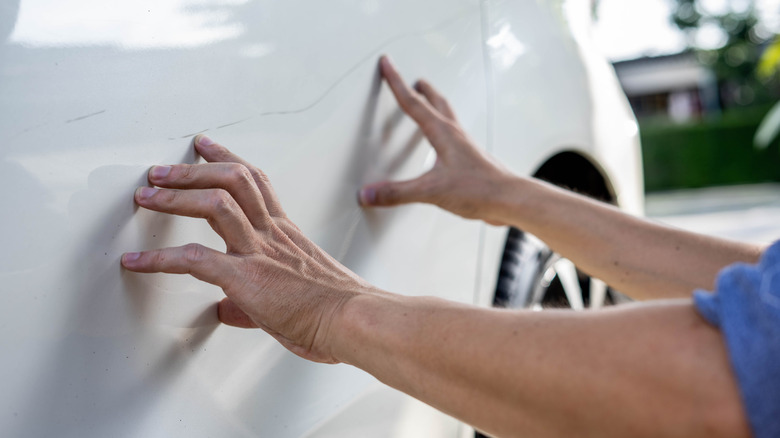What Does 'Minor Damage' Mean On Carfax?
For most people, the car-buying experience is a mix of excitement, nerves, and stress. If you're buying a used car, you might be extra cautious because there's more of a risk involved. After all, nobody wants to pay thousands of dollars for a used vehicle only to find out down the line that they're saddled with problems they didn't see coming. That's why many of us put on our detective caps when shopping for a used car, and one of the first things we do is check the Carfax report. While a Carfax report isn't foolproof, it's a tool we can use to quickly learn about the vehicle, including title history, recalls, and whether the car we're considering has been in an accident.
As you review a Carfax report for red flags, you may see the term "minor damage" and wonder what exactly it means. When you buy a used car, you know it won't be perfect, but seeing the word 'damage' listed on the Carfax report, even if it's minor, might give you pause. If you come across "minor damage" on a Carfax report, in most cases, it refers to cosmetic issues like small dents, scratches, or bumper scuffs that don't affect the car's structural integrity. It's important to keep in mind that "minor damage" doesn't mean a car was involved in an accident; the term also covers things like parking lot scrapes or door dings.
Minor damage often refers to cosmetic issues
When you're doing your best to avoid mistakes when buying a used car, it's only natural that you'd want to investigate further when you see "minor damage" listed on the Carfax report. Carfax uses a Damage Severity Scale to assess the amount of damage a vehicle has sustained from a reported accident or incident. The damage can fall into three categories: minor, moderate, or severe. In the report, you'll see a graphic that shows you where the damage is located and a scale that indicates its severity.
If you see the term "minor damage" on the report, the accident or incident the car was involved in likely resulted in minimal harm to the vehicle. That means it may have cosmetic scrapes or dings from a minor bump in a parking lot or a low-speed collision. For example, a cracked headlight or a small dent in the hood would fall under this category. Still, even cosmetic damage can impact a car's resale value regardless of its severity, as potential buyers may see any reported damage as a possible red flag. You should also keep in mind that the term "minor" is subjective, and what's minor to one person may be a dealbreaker to another.
If you see "minor damage" on the Carfax report, you should dig a little deeper, ask the seller about it, and compare what they say to the information you already have. Ask them for documents related to repairs, and if any work that was done to repair the damage is still covered by a warranty. You should also have a certified mechanic inspect the car before you finalize a purchase.

